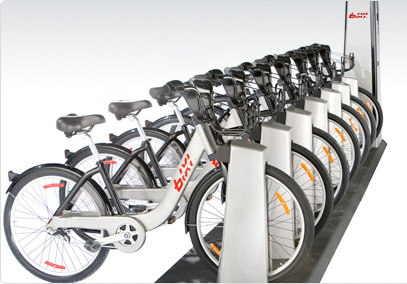|
These ads, however, are sometimes obscured by
stickers that declare “Non à la marchandisation de l’espace public”
and “Bixi libre” (roughly, “No ads on public property” and “Free Bixi”).
When I first saw these stickers, I wondered: Since when are Bixis public
property?
|
Setting the Record Straight |
 The Bixis are operated by a private non-profit that calls itself the
Public Bike System Company. It’s not “public” in the sense that the city
parks are public, but its relationship to the city is closer than most,
and it has recently been the recipient of taxpayer largess, so maybe the
sticker-pasters aren’t that far off the mark.
The Bixis are operated by a private non-profit that calls itself the
Public Bike System Company. It’s not “public” in the sense that the city
parks are public, but its relationship to the city is closer than most,
and it has recently been the recipient of taxpayer largess, so maybe the
sticker-pasters aren’t that far off the mark.
Last month it was announced that Bixi would get a “$108-million bailout”
from the city of Montreal. The bailout takes the form of a complex
combination of loans and lines of credit, but public reaction from
people who did not read these details was predictably outraged: Why
should people who never use the bike rental service pay for it?
Roger Plamondon, Chairman of the Board of Directors of Public Bike
System Company, the private non-profit that manages Bixi, hurried to
clear up the confusion in a press release entitled “Bixi. Establishing
the facts.”
The city,
he explained, is not giving Bixi $108 million. Good heavens
no! There is a loan, yes, of $37 million, but this is will be repaid
with interest, and the rest is merely lines of credit and so on. Bixi
owes the bailout money to its parent company, Stationnement de Montréal,
which also runs the parking meters in town.
Far from being a failing company, Bixi is a victim of its own success,
Plamondon explains. Its rapid expansion to other cities has led to a
“liquidity problem” that forces it to tap the city for this loan.
Plamondon does not bother to explain the reports that the staff of
Public Bike System threatened to take the Bixis off the street and
resign en masse
if the city didn’t come up with
the money, odd behaviour for the managers of a thriving company. Nor does he bother
to explain why, if the company is such a success, it can’t get loans
from private investors who at least play with their own money.
|

